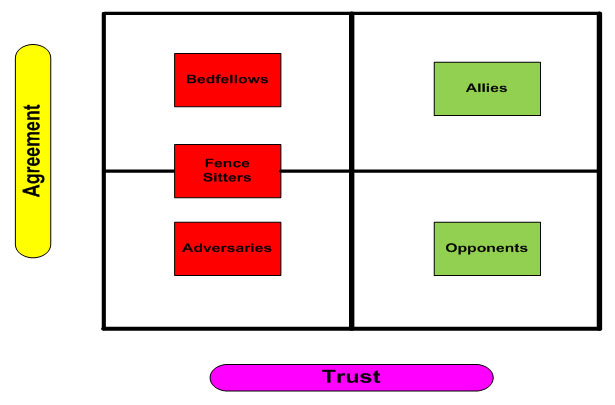Have you ever been a little stumped when someone asked how you would describe your work relationship with a coworker?
Developing and maintaining strong relationships is a key part of organizational success. You have to be able to network internally within your company to exert influence and make things happen and good relationships will always facilitate your ability to do this.
I had a female client who struggled to summarize how she felt about a colleague. She admired his experience, work ethic, creativity, and communication skills, but just didn’t feel confident about the nature of her connection with him.
He displayed some good leadership traits but there were other things about the relationship that made her cautious and uncomfortable in her dealing with him. So I asked her the following…
When you disagree with him:
- Does it stay focused on getting the best solution or is it about his solution?
- Does it often begin to feel like he takes it personally when it should just be business?
- Does he demonstrate a sincere interest in your perspectives?
How an individual manages agreements and disagreements is critical to success.
Do you feel he is:
- Reliable and dependable in doing what he says when he says he will?
- Gives you honest and candid feedback in a constructive manner when you ask for it?
- Will maintain a confidence you shared with him?
If you answered yes to all three of these questions, you can be sure you are well on your way to a trusting relationship.
Competing Demands of Trust and Agreement
Peter Block wrote a wonderful book, The Empowered Manager: Positive Political Skills at Work, and in Chapter 5 he creates a model that can assist us in dealing with these potentially competing demands of trust and agreement.
A few basics to consider:
Trust:
Trust takes time to develop and nurture and can be lost in a flash. You need to be consistent, assertive and politically adept at building a coalition to support your vision or goal.
But positive political skills end when you act in a sneaky or duplicitous fashion.
Those three questions above are good guidelines for the behavior that looks trustworthy to others. We must work on maintaining trust on an ongoing basis.
Agreement:
You can never expect blanket agreement from others. Those that profess to are often “Yes” people and that can be more dangerous than a cantankerous, “prove it to me” type because they want to agree more than exercise deliberate judgment.
What matters most is how we agree to disagree. This will become clearer as we examine the model Block created (pg. 137 – 160 from The Empowered Manager):

Let’s examine each of the 5 positions on this chart:
- Allies (High Trust / High Agreement): They share our vision or goals and want to achieve outcomes by behaving in a manner that is consistent with ours.
- Adversaries (Low Trust / Low Agreement): People only fall into this quadrant because we have failed to negotiate an agreement or build trust with them. This does not mean we haven’t tried hard to do this, but only that they won’t cooperate or have a radically different vision. If you confirm your Boss is an adversary, be prepared to move on. If a subordinate is an adversary, the nicest thing you can do is help them to move on.
- Bedfellows (High Agreement / Low Trust): They profess agreement with you on many topics, but you do not feel that you have a trusting relationship. There seems to be a lot of caution about their connection with us or with them voicing their candid opinion about our vision.
- Fence Sitters (Low Trust / Unknown Agreement): These are often the ultimate bureaucrats and operate out of pessimism and helplessness. They are often glib and seemingly effective communicators, but they consistently prevaricate about their positions. You have to try and flush them out to establish their position but are often not worth too much effort.
- Opponents (High Trust / Low Agreement): These are folks you trust but will often disagree. The name Opponent is an accurate but unfortunate one since our society teaches us to vanquish our opponents. But these are the people whose relationship you need to carefully cultivate because, since you trust them, they will beat up your idea and not you. That will usually mean that you end up with a better idea!
I hope you can use this model to reflect on your current relationships. With each person, for each task or initiative that comes, up you must:
- Exchange vision, purpose or goals;
- Affirm or negotiate an agreement;
- Affirm (or reaffirm) or negotiate trust.
I really encourage you to read more of Peter Block’s work, especially chapter 5 in The Empowered Manager.
I look forward to your thoughts and comments below.



Leave a Reply